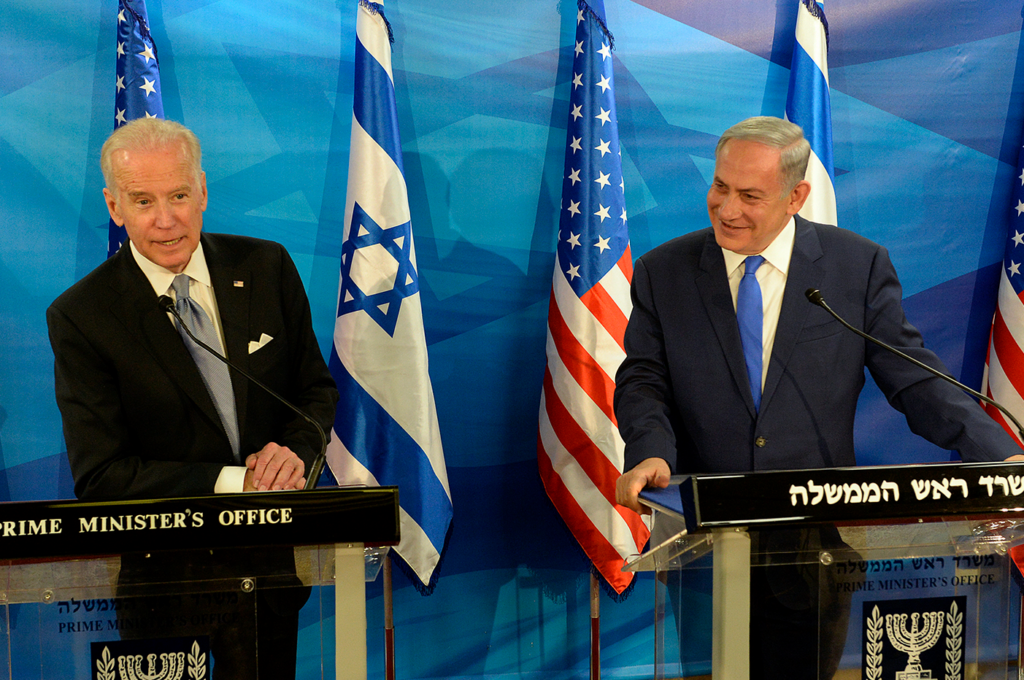By Ryan Grim
Photos: Wikimedia Commons
From 2020 to 2024, Democrats saw a staggering dropoff in support at the presidential level, with some 19 million people who voted for Joe Biden staying home (or not mailing in their ballots) in 2024. Now, a new survey conducted by YouGov suggests Biden’s support for Israel’s unrelenting assault on Gaza played a surprisingly large role in the choice of those previous Biden supporters not to vote.

The top reason those non-voters cited, above the economy at 24 percent and immigration at 11 percent, was Gaza: a full 29 percent cited the ongoing onslaught as the top reason they didn’t cast a vote in 2024.
Looking narrowly at states that swung from Biden in 2020 to Trump in 2024, the number is smaller. But in those states, 20 percent still cited Gaza as the reason they didn’t vote again. The poll was paid for by the Institute for Middle East Understanding, which has been an outspoken critic of Israel’s assault on Gaza.
Before firmly demonstrating that Gaza cost Democrats the election, it’s important to keep a handful of caveats in mind. Even if October 7 and the resulting genocide had never happened, it’s fair to assume some number of those non-voters still would not have voted, and would have cited a different top reason for not voting. Citing a top reason for not voting is far different than it being the only reason not to vote.

And because the turnout drop off was smaller in swing states, Gaza may not have been decisive on its own. Whenever surveys confirm views we already hold, or tell us things we want to be true, it’s worth approaching their findings with increased skepticism. Still, even the most biased poll can only manufacture so much of a response. Even if the true numbers aren’t as stark as this survey found, it points in a clear direction: Biden’s ruthless support for Israel’s genocide, and the refusal of Democratic presidential nominee Kamala Harris to break with him, hurt her among voters who stayed home.
A previous survey, taken during the election by YouGov and also sponsored by IMEU, found strong evidence that Harris would be significantly boosted by breaking with Biden on Gaza and applying real pressure on Israel. But Harris chose not to do so.
Breaking with Biden on Gaza could have had knock on effects elsewhere, as Harris never successfully answered a question that dogged her throughout her campaign: What would she have done differently than Biden? Or what would she do differently in the future?

Eventually, Harris settled on an unsatisfying answer. “My presidency will not be a continuation of Joe Biden’s presidency, and like every new president that comes into office, I will bring my life experiences, my professional experiences, and fresh and new ideas,” she said in one emblematic response. “Clearly, I am not Joe Biden,” she said at the presidential debate. Yet, she had no answer for how they diverged, other than “And I am certainly not Donald Trump.”
In an appearance on The Late Show with Stephen Colbert, she reiterated these points, and followed with a gobbledygook response about American aspirations and opportunity and small businesses. In other high-profile interviews, she similarly declined to offer any answer as to what she would do differently, other than be a different person.
Of course, diverging from Biden on Gaza risked losing voters who supported his policy. But a close look at the survey suggests that risk was low compared to the potential reward. Voters who were with Biden in 2020 and stuck with Harris in 2024 were asked if breaking with him on Gaza would make them more or less enthusiastic about voting for Harris. By a 35 to 5 margin, they said doing so would have made them more enthusiastic to vote for her, with the remainder saying it would have made no difference.

Meanwhile, Democrats’ unshakable commitment to the war also blended with concerns that the party was not focused on issues that mattered to Americans, as I argued previously.
The survey showed that the issue of Gaza was most salient among white voters, 34 percent of whom said it was the top reason they didn’t vote for Harris, and Hispanic voters (27 percent), while less so with black voters (just 9 percent).
The issue factored most heavily in Arizona, Michigan, and Wisconsin, and less so in Pennsylvania (19 percent cited it as the top reason not to vote), Nevada, (13), and Georgia (6), according to the survey.
- Arizona: 38%
- Georgia: 6%
- Michigan: 32%
- Nevada: 13%
- Pennsylvania: 19%
- Wisconsin: 32%
On January 12, The Times of Israel published an interview with Jack Lew, Biden’s ambassador to Israel, in which he acknowledged the impact of the administration’s decisions on Gaza.
“Standing with Israel for these past 15 months, with huge opposition in the media, in parts of his own party,” he said, “you could argue that it contributed to making his challenge for reelection insurmountable.”

Drop Site News is a reader-supported publication. To support our work, please consider becoming a paid subscriber today.





